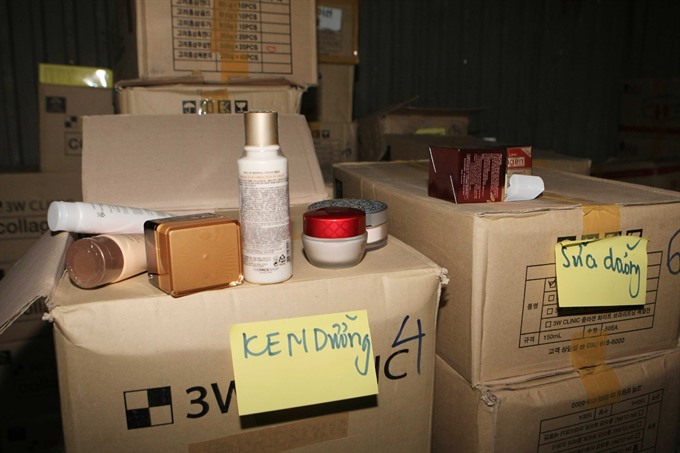

The number of people infected with Steven-Johnson Syndrome (SJS), a serious skin condition that can be life-threatening, is increasing in Viet Nam, experts say.
 |
| Dozens of tonnes of cosmetic products were recently seized by Hà Nội City police in collaboration with the Market Surveillance Authority during a warehouse raid in Long Biên District. Cosmetics of dubious quality have become a serious health threat. - VNA/VNS Photo Doãn Tuấn |
HCM CITY -- The number of people infected with Steven-Johnson Syndrome (SJS), a serious skin condition that can be life-threatening, is increasing in Viet Nam, experts say.
They blame the trend on indiscriminate use of drugs without prescriptions.
Trần Thiên Tài of the Allergy and Immunology Clinic of Ho Chi Minh University of Medicine and Pharmacy, said the clinic had recently admitted many patients with SJS.
SJS causes the skin to blister and peel off, and also affects the patients’ mucus membranes.
Tài said most of the patients were suffering adverse effects of antibiotics or drugs taken to treat gout.
A number of SJS cases were caused by an allergic reaction to cosmetic products like skin whitening creams, he added.
A 55-year-old male patient from HCM City visited the clinic after seeing some rashes on his skin as well as ulcers in the mouth and genital region.
He told doctors that the symptoms appeared after he took a drug to treat gout for 20 days.
After examining him and conducting tests to determine if the patient was infected with SJS, he was admitted to the clinic for treatment and monitoring.
A 42-year-old woman from Tiền Giang Province was hospitalised with similar symptoms. The patient had previously used a cream without clear origin for removing dead skin cells and whitening her skin.
"Both patients are in stable condition now," Tai said.
Nguyễn Văn Đoàn, a doctor with the Allergy and Immunology Faculty of the Bach Mai Hospital, said the habit of using drugs suggested by pharmacists, friends and relatives was the reason for increasing numbers of patients suffering adverse effects.
In Việt Nam, it is very easy for people to buy drugs, whether antibiotics or cough medicines, without a doctor’s prescription. Many pharmacies ignore regulations that prohibit sale of drugs without prescriptions.
Once a person reacts to the drugs, they might suffer rashes or even the Quincke Syndrome (which causes repetitive episodes of swelling, frequently of the face, lips, tongue, limbs and genitals. It can also lead to severe abdominal pain and in the upper respiratory tract, become life-threatening.)
In many cases, adverse effects of the drugs might leave lesions on eyes, mouths and genitals, like Lyell Syndrome (another skin condition that can be life-threatening) or SJS.
Tài said SJS typically occurs in people 25 to 47 years old, although it can affect people at any age. Men are more prone to the condition than women.
Newly infected SJS cases account for about 1.1 per 1 million people worldwide annually and the mortality rate is about five per cent.
The condition is mainly triggered by adverse effects of antibiotics, anti-inflammatory drugs and gout medications.
It can also be caused by viral infections and malignancies or unknown reason.
SJS usually begins with fever, sore throat and cough, Tài said.
He advised people who detected abnormal skin symptoms, particularly those who have the habit of using medicines and cosmetics without clear origin to consult doctors immediately and receive timely treatment.
Treatment for SJS is similar to that given for patients with thermal burns, and continued care can only be supportive e.g. intravenous fluids and intravenous feeding, focusing on controlling the infection. In addition, patients can be treated with corticosteroid and other kinds of medicines.
It is necessary to identify the cause of the disease, Tài said, adding that those suffering adverse effects of a drug should not use it again in the future.
"People should only use drugs, chemicals and cosmetics when necessary," Đoàn said.
He emphasised that people should take the medicine as prescribed by doctors. They should avoid self-medication and also refrain from recommending drugs to others, he added. — VNS





.jpg)



